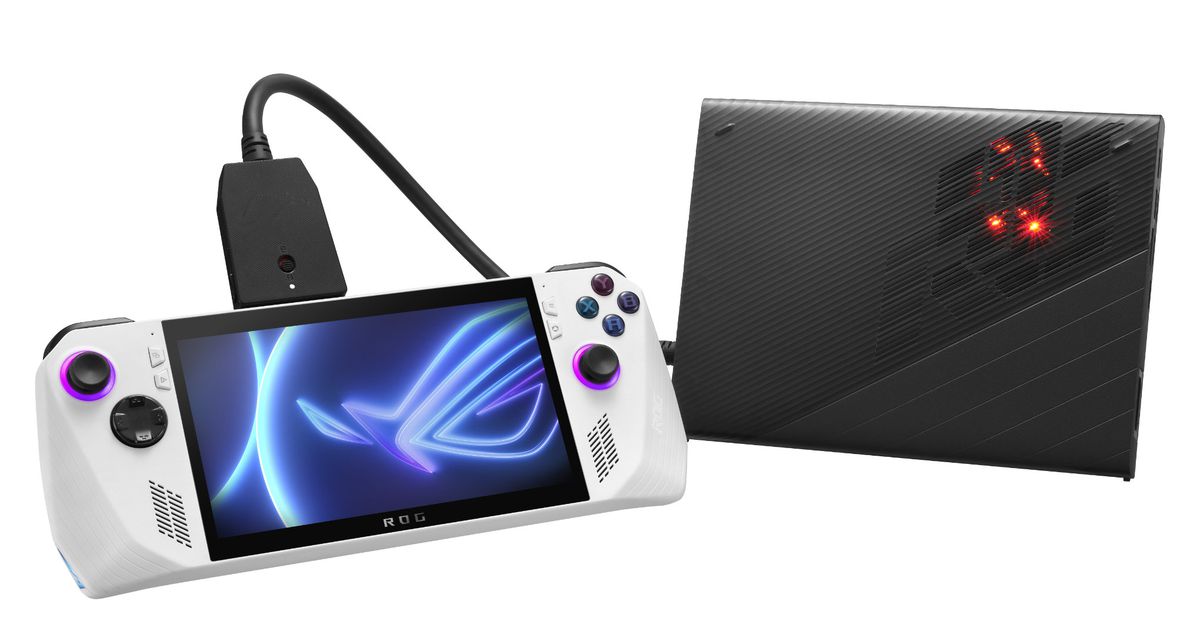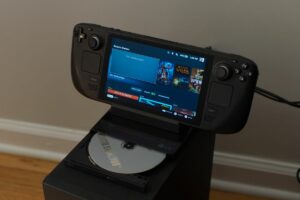
The Asus ROG Ally is a beast of a portable gaming PC, containing the AMD Z1 Extreme, the most capable processor to be put inside of a handheld yet. Whether you dig its made-for-gamers aesthetic or not, the ROG Ally is full of eyebrow-raising specs and features that set it apart from its biggest competitor, the Steam Deck.
There’s a lot that sets the ROG Ally apart from its competitors, which of course includes more than just the Steam Deck. In addition to its fast processor and RAM specs, it is, to my knowledge, the first handheld to feature a faster UHS-II microSD card slot, allowing faster transfer speeds than its competitors. Also, it runs Windows 11 software out of the box, not Linux, like the Steam Deck does by default. Now, that’s not entirely novel, but it ensures that the ROG Ally will be compatible with more games, whether they’re on Steam, PC Game Pass, or on the Epic Games Store.
Okay, let’s allow the table below to do the rest of the talking.
Asus ROG Ally comparison table
| Category | Asus ROG Ally (Z1 Extreme) | Asus ROG Ally (Z1) | Valve Steam Deck | Ayn Odin | Ayaneo 2 | Logitech G Cloud |
|---|---|---|---|---|---|---|
| Category | Asus ROG Ally (Z1 Extreme) | Asus ROG Ally (Z1) | Valve Steam Deck | Ayn Odin | Ayaneo 2 | Logitech G Cloud |
| Starting price | $699 | $599 | $399 | $239 | $1,099 | $299 |
| Operating System | Windows 11 | Windows 11 | SteamOS (Linux-based) | Android 10 | Ayaneo OS (Linux-based) / Windows 11 | Android 11 |
| Display | 7-inch (1920 x 1080, 120 Hz) IPS touchscreen, 500 nits at peak brightness | 7-inch (1080p, 120 Hz refresh rate) IPS touchscreen, 500 nits at peak brightness | 7-inch (1280 x 800, 60Hz) IPS touchscreen, 400 nits at peak brightness | 5.98-inch (1920 x 1080, 60 Hz) IPS touchscreen | 7-inch (1920 x 1200, 10-120 Hz) LCD, 400 nits | 7-inch (1920 x 1080, 60 Hz) IPS touchscreen, 450 nits at peak brightness |
| Processor | AMD Ryzen Z1 Extreme | AMD Ryzen Z1 | Custom AMD APU | Qualcomm Snapdragon 845 | AMD Ryzen 7 6800 U | Qualcomm Snapdragon 720G |
| RAM | 16 GB LPDDR5 | 16 GB LPDDR5 | 16 GB LPDDR5 | 4 GB LPDDR4x | 16 GB LPDDR5 | 4 GB LPDDR4x |
| Storage | 512 GB | 512 GB | 64 GB, 256 GB, 512 GB options | 64, 128, 256 GB options | 512 GB, 1 TB, 2 TB options | 64 GB eMMC |
| M.2 SSD support | Yes, M.2 2230 | Yes, M.2 2230 | Yes, M.2 2230 | No | Yes, double-sided support for M.2 2280-sized SSDs | No |
| Connectivity | Wi-Fi 6E, Bluetooth 5.2 | Wi-Fi 6E, Bluetooth 5.2 | Wi-Fi, Bluetooth 5.0 | Wi-Fi, Bluetooth 5.0 | Wi-Fi 6, Bluetooth 5.2 | Wi-Fi 5, Bluetooth 5.1 |
| Ports | USB-C 3.2 Gen 2 charging port with DP 1.4 video out support, UHS-II microSD card slot, 3.5mm headphone jack | USB-C 3.2 Gen 2 charging port with DP 1.4 video out support, UHS-II microSD card slot, 3.5mm headphone jack | USB-C 3.2 Gen 2 charging port with DP 1.4 video out, UHS-I microSD card slot, 3.5mm headphone jack | USB-C 3.1 charging port, Micro HDMI, 3.5mm headphone jack | Two USB-C USB 4.0 charging ports with DP 1.4 video output support, high-speed microSD card slot, 3.5mm headphone jack | USB-C 3.1 charging port, microSD card slot, 3.5mm headphone jack |
| eGPU support | Yes | Yes | No | No | Yes | No |
| Biometrics | Fingerprint sensor embedded in power button | Fingerprint sensor embedded in power button | None | None | Fingerprint sensor embedded into power button | No |
| Battery capacity | 40 Wh | 40 Wh | 40 Wh | 6,600 mAh | 50.22 Wh | 23.1 Wh |
- SEO Powered Content & PR Distribution. Get Amplified Today.
- PlatoAiStream. Web3 Data Intelligence. Knowledge Amplified. Access Here.
- Minting the Future w Adryenn Ashley. Access Here.
- Buy and Sell Shares in PRE-IPO Companies with PREIPO®. Access Here.
- Source: https://www.polygon.com/23716764/asus-rog-ally-steam-deck-ayaneo-ayn-logitech-specs-features-versus-compared
- :is
- :not
- 1
- 1 TB
- 11
- 22
- 23
- 27
- 500
- 7
- 8
- a
- addition
- allow
- Allowing
- Ally
- also
- AMD
- and
- apart
- Asus
- At
- BE
- below
- Biggest
- bluetooth
- Box
- but
- by
- capable
- card
- charging
- compare
- comparison
- compatible
- competitor
- competitors
- course
- Default
- DIG
- do
- does
- embedded
- ensures
- entirely
- EPIC
- Epic Games
- Epic Games Store
- extreme
- false
- FAST
- faster
- Feature
- Features
- First
- For
- from
- full
- game
- Games
- gaming
- gaming pc
- Gen
- How
- HTTPS
- in
- includes
- into
- IT
- ITS
- jpg
- just
- knowledge
- LCD
- like
- linux
- Lot
- more
- most
- my
- novel
- now
- of
- on
- or
- OS
- out
- output
- pass
- PC
- pc game
- Peak
- plato
- Plato Data Intelligence
- PlatoData
- Polygon
- ports
- power
- Processor
- put
- RAM
- Rate
- REST
- ROG
- set
- Sets
- snapdragon
- Software
- specs
- speeds
- Steam
- store
- support
- table
- talking
- than
- that
- The
- to
- Touchscreen
- transfer
- usb
- USB-C
- Video
- whether
- which
- will
- windows
- windows 11
- with
- X
- yet
- you
- zephyrnet









